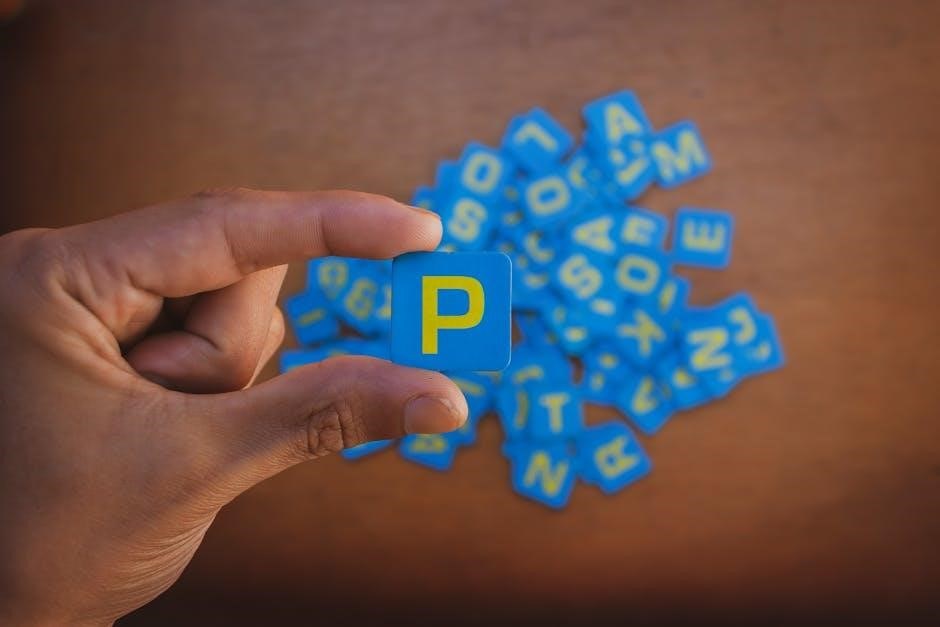Welcome to the FTC Game Manual 1, your essential guide for the 2023-2024 season. This manual outlines the rules, scoring, and design guidelines for FTC competitions, ensuring a fair and exciting experience for all participants.
Overview of the FTC Game Manual
The FTC Game Manual 1 serves as the primary resource for teams participating in the FIRST Tech Challenge (FTC). It provides a comprehensive overview of the competition, including game rules, robot design requirements, and event structure. Divided into sections, the manual ensures clarity and accessibility for teams. Part 1 focuses on foundational rules, while subsequent parts delve into specific details. Teams must adhere to the guidelines outlined to ensure eligibility and compliance. The manual is updated annually to reflect the current season’s challenges and changes. Additional resources, such as the one-pager, offer a quick reference for key information. Understanding the manual is essential for success in FTC competitions.
Importance of Understanding the Manual
Understanding the FTC Game Manual 1 is crucial for teams to navigate the competition effectively. It outlines rules, penalties, and expectations, ensuring fair play and compliance. Teams that grasp the manual can design robots within specifications, avoid disqualification, and maximize scoring potential. The manual also clarifies roles and responsibilities, such as drive team duties and field setup, helping teams prepare thoroughly. Staying updated with the latest version ensures teams adapt to any rule changes or updates. Mastery of the manual fosters strategic planning, collaboration, and innovation, which are key to achieving success in FTC events. It serves as the foundation for a successful and enjoyable competition experience.

Game Rules and Regulations
The FTC Game Manual 1 provides detailed rules and regulations governing gameplay, robot design, and competition conduct, ensuring fair play and adherence to official guidelines for all teams.
General Game Rules for the 2023-2024 Season
The FTC Game Manual 1 outlines the general rules for the 2023-2024 season, covering match duration, robot size constraints, and field setup. Teams must adhere to these guidelines to ensure fair competition and maintain the integrity of the game. Key aspects include robot dimensions, weight limits, and prohibited components. The manual also specifies penalty systems for rule violations, emphasizing sportsmanship and adherence to FTC’s core values. These rules are essential for teams to design and operate their robots effectively, ensuring a level playing field for all participants throughout the competition season.
Robot Design and Build Requirements
Robot design and build requirements for FTC competitions are detailed in Game Manual 1, ensuring safety, fairness, and innovation. Robots must comply with size and weight limits, with a maximum dimension of 18 inches in width, depth, and height when measured as a cube. Teams must use approved materials and components, avoiding prohibited items like combustible materials or high-risk mechanisms. The manual also specifies requirements for electrical systems, motor usage, and software integration. Official FTC software tools, such as the FTC Robot Controller app, must be used for programming and operation. Inspections ensure compliance, and violations result in penalties or disqualification. These guidelines promote creativity within structured boundaries, fostering a competitive yet equitable environment for all teams.
Match Types and Scoring System
The FTC competition features various match types, including Qualifying Matches, Elimination Matches, and Skills Challenges, each with unique objectives. The scoring system rewards teams for completing specific tasks, such as scoring cargo, climbing levels, or achieving alliance goals. Points are awarded based on the difficulty and complexity of the tasks performed. Penalties are deducted for rule violations or unsafe actions. The scoring system is designed to encourage strategic gameplay, collaboration, and innovation. Teams earn ranking points in Qualifying Matches, which determine their seeding for Elimination Matches. The scoring structure is detailed in Game Manual 1, ensuring clarity and consistency across all events.

Robot Design and Construction
Robot Design and Construction focuses on hardware and software requirements, ensuring compliance with official FTC standards. This section covers essential guidelines for building competitive robots effectively.
Hardware and Software Requirements
Understanding hardware and software requirements is crucial for FTC robot design. The FTC Software Development Kit (SDK) includes tools like the Robot Controller app and Driver Station app. Teams must use approved programming languages such as Java, Kotlin, or Blocks for robot control. Hardware components must comply with FTC regulations, ensuring safety and fairness. The manual details specific constraints on motors, servos, and sensors; Teams are expected to use FTC-approved parts to maintain competition integrity. Adherence to these guidelines ensures robots are eligible for competition and function within the game’s framework. Proper implementation of these requirements is essential for a successful FTC season.
Official FTC Software Tools
The FTC Software Development Kit (SDK) is essential for robot programming. It includes the Robot Controller app, which manages robot operations, and the Driver Station app, used for controlling the robot during matches. These tools are designed to work seamlessly with FTC-approved hardware components, ensuring compatibility and optimal performance. The SDK supports programming in Java, Kotlin, and Blocks, catering to different skill levels. Regular updates are released to enhance functionality and address technical issues. Teams must use the official FTC software to ensure compliance with competition rules and to integrate seamlessly with the field setup. Proper utilization of these tools is vital for achieving peak performance in FTC competitions.
Robot Inspection and Field Inspection Process
Robot inspection ensures compliance with design and safety standards outlined in the FTC Game Manual. Teams must pass a self-inspection checklist before official reviews. Field inspection verifies the competition area meets safety and rule requirements. Both processes are mandatory for participation. Inspectors check for prohibited modifications, proper hardware use, and adherence to size constraints. The field is inspected for correct setup, obstacle placement, and barrier integrity. These inspections ensure fair competition and safety for all participants. Failure to pass may result in disqualification. Detailed inspection criteria are provided in the manual to guide teams and event organizers effectively.

Competition Structure
The FTC competition structure includes local, regional, and championship levels, with teams competing in matches. Drive teams play a crucial role in each event.
Types of FTC Events: Qualifying, Championship, and Scrimmage Tournaments
FTC competitions are structured into three main event types: Qualifying, Championship, and Scrimmage Tournaments. Qualifying Tournaments are official events where teams earn advancement to higher levels. Championship Tournaments, such as Regional and World Championships, determine the season’s top performers. Scrimmage Tournaments are unofficial, providing teams with practice opportunities. Official events are governed by the FTC Game Manual, ensuring consistency and fairness. Teams must adhere to rules and guidelines to participate. These events showcase robotics skills, strategic thinking, and teamwork, fostering a competitive yet collaborative environment.
Drive Team Roles and Responsibilities
The Drive Team is a group of up to 5 team members responsible for operating the robot during matches. Their primary roles include driving, navigating, and executing game strategies. The Driver controls the robot’s movement, while the Navigator focuses on game elements and scoring opportunities. Communication and teamwork are critical to maximize efficiency. Additionally, the Drive Team must adhere to match rules and time constraints. Their performance directly impacts the team’s success in competitions. Proper coordination and decision-making ensure effective execution of tactics, making the Drive Team essential to achieving victory in FTC events. Their roles are clearly defined to maintain clarity and focus during high-pressure situations.
Field Setup and Game Environment
The FTC competition field is a standardized setup designed to ensure fair and dynamic gameplay. It includes a playing area with specific zones and elements tailored to the season’s game challenge. Teams compete in alliances, with two robots working together to achieve objectives. The field is monitored by referees who enforce rules and manage match flow. Additional areas like the pit and queuing zones organize team movements. The environment is designed to simulate real-world engineering challenges, fostering innovation and strategic thinking. Clear field markings and consistent layouts ensure all teams understand the play area, facilitating focused competition and teamwork. This setup is crucial for a balanced and engaging FTC experience.

Judging and Awards
Judging and awards are central to FTC competitions, recognizing excellence in robot design, teamwork, and innovation. Judges evaluate teams based on predefined criteria, such as engineering, strategy, and core values.
Judged Awards and Criteria
Judged awards in FTC competitions recognize teams for outstanding performance, innovation, and adherence to core values. Awards include the FTC Innovation Award, Design Award, and Motivate Award, among others. Judges evaluate teams based on interviews, robot design, and performance, emphasizing engineering quality, creativity, and strategic thinking. Criteria also include teamwork, community engagement, and embodiment of Gracious Professionalism. Teams must demonstrate a deep understanding of the game challenge and showcase innovative solutions. The judging process ensures fairness and transparency, with awards celebrating technical excellence, teamwork, and sportsmanship. These awards inspire teams to strive for greatness both on and off the field.
Gracious Professionalism and Core Values
Gracious Professionalism and Core Values are fundamental to the FTC program, fostering a culture of respect, kindness, and integrity. Teams are expected to demonstrate empathy, support, and fairness toward competitors, judges, and volunteers. These values emphasize collaboration, sportsmanship, and learning over winning. Teams must embody these principles during competitions, interviews, and interactions, showcasing a positive attitude and commitment to the FTC mission. By upholding Gracious Professionalism, participants create an inclusive and supportive environment that reflects the spirit of FTC. These values are integral to the judging process and are celebrated throughout the competition season, inspiring teams to excel both technically and ethically.
Official Resources and Updates
Access the FTC Game Manual 1 and one-pager at FIRST’s resource library. Stay updated with FTC announcements via their official website and email updates for the latest information.
Accessing the Game Manual and One-Pager
The FTC Game Manual 1 and the one-pager are available on the FIRST Inspires website. These documents provide detailed rules, game descriptions, and quick references for the 2023-2024 season. Teams can download the manual in PDF format, while the one-pager offers a concise overview of the game challenge. Ensure to review both resources thoroughly to understand competition requirements and stay informed about updates. Additionally, archived versions of past manuals are accessible for reference, supporting teams in understanding the evolution of FTC rules and game dynamics over time.
Staying Updated with FTC Announcements
Staying informed about FTC updates is crucial for a successful season. Regularly visit the FIRST Inspires website for the latest announcements, rule updates, and resource releases. Subscribe to the FTC newsletter and follow official social media channels to receive timely notifications. Additionally, review the Official FTC Q&A Forum for clarifications on game rules and manual interpretations. Teams should also monitor their email for updates, as critical information is often shared via email blasts. By staying connected, teams can ensure compliance with the latest guidelines and maximize their performance in competitions. Consistent communication within the FTC community helps maintain a fair and engaging experience for all participants.